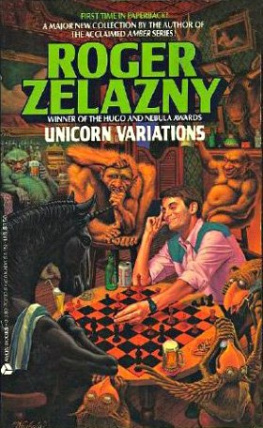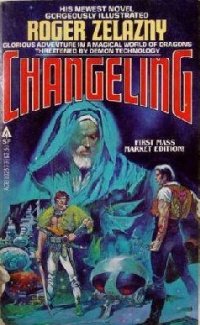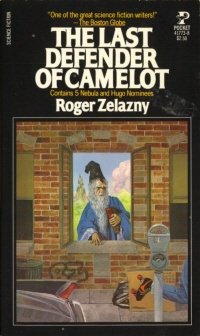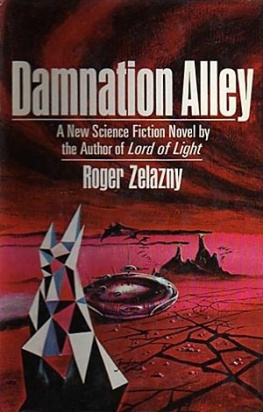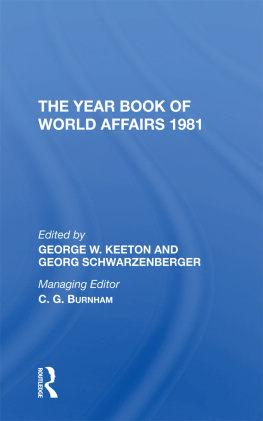UNICORN
VARIATIONS
RogerZelazny
TIMESCAPEBOOKS Distributed by Simon and Schuster New York
Thisassemblage is for Phil and Marsha Higdon
Introduction
Hereis another collection of things written by me, drawn from various points overthe past two decades. Some I recall fondly; others I had all but forgotten.
Inreviewing the stories included here, I was surprised by the number of taleswritten to order, i.e., to go behind a magazine's cover painting (of which moreanon) or to qualify for inclusion in a theme anthology.
Ipause to reflect upon the phenomenon of the theme anthology: In the Old Days(circa forties and fifties) collections of science fiction stories were justcollections of science fiction stories, none of them necessarily resembling anyof the others in major particulars. In recent years, however, collections ofstories possessed of a common theme have become the rule in the science fictionanthology. I cannot look upon writing such stories as a bad thing. Some verygood work has appeared in theme anthologies. But such volumes might fairly beviewed as something of a constraint upon writers.
Andthinking back, I began writing for magazines in the days when they wereconsidered family publicationsmeaning that one did not use profanity beyondoccasional hells and damns, describe sexual acts, have one's characters discusspolitics in any but the broadest terms or indulge in religious speculation.
Earlierthis year I visited the Soviet Union in the company of some other peopleconnected with science fiction. We met with a number of Russian and Ukrainianwriters and editors. When we were told that they preferred to publish storieswith happy endings, stories containing a minimum of violence, our firstreaction was a knowing nod. Really.
Thereare always restrictions. I do not feel any imposed upon me now in the sense ofeditorial censorship. But there are restrictions in the form of my ownlimitations as a writer, and there are self-imposed restrictions having to dowith story structure and matters of my temperament and taste. I am free to workwithin these limits. When I write the first sentence to any story, though, Isurrender a lot more freedom. I have set a course. I have restricted myselfeven further. Freedom of expression must also bow to the necessity for clearcommunication, as many of science fiction's failed experiments of the sixtiesdemonstrate.
GoreVidal has suggested that a writer has a limited cast of charactershis ownrepertory company, so to speakand that, with different makeup, they enact allof his tales. I feel he has a point there, and that this constitutes yetanother limitation (though I like to feel that over the years one can pensionoff a few, and I do try to seek out new talent).
Allof these things considered, it is not surprising that one can detect echoes,correspondences and even an eternal return or two within the work of a singleauthor. The passage of time does bring changes, yea and alas; but still, Iwould recognize myself anywhere. In this sense, any writer's total output mightbe looked upon as a series of variations....
Allof that to justify a title.
* * *
Iwant to thank all of those people who've offered me employment in hardwarestores, but I'd really prefer to keep on writing.
Unicorn Variation
This story came into beingin a somewhat atypical fashion. The first movement in its direction occurredwhen Gardner Dozois phoned me one evening and asked whether I'd ever done ashort story involving a unicorn. I said that I had not. He explained then thathe and Jack Dann were putting together a reprint anthology of unicorn stories,and he suggested that I write one and sell it somewhere and then sell themreprint rights to it. Two sales. Nice. I told him that I'd think about it.Later, I was asked by another anthologist whether I'd ever done a story set ina barroomand if so, he'd like it for a reprint collection he was doing. Iallowed that I hadn't. A week or so after that, I attended a wine tasting withthe redoubtable George R. R. Martin, and during the course of the evening Idecided to mention the prospective collections in case he had ever done aunicorn story or a barroom story. He hadn't either, but he reminded me thatFred Saberhagen was putting together a reprint collection of stories involvingchess games (Pawn to Infinity). "Why don't you," he said"write a story involving a unicorn and a chess game, set it in a barroomand sell it to everybody?" We chuckled and sipped. A few months later, Iwent up to Vancouver, B.C., to be the guest of V-Con, a very pleasant regionalscience fiction convention. I had decided to take my family on the InlandPassage Alaskan cruise after that Now right before I left New Mexico I had readItalo Calvin's Invisible Cities, and when I read the section titled"Hidden Cities. 4." something seemed to stir. It told of the citywhere the inhabitants exterminated all of the vermin, completely sanitizing theplace, only to be haunted then by visions of creatures that did not exist.Later, during the convention, things began to flow together; and on my way downto the waterfront to board the Prinsendam, I stopped at a number ofbookstores, speed reading all of the chess sections until I found what Iwanted, two hours before sailing time. I bought the book. I sailed. I wrote"Unicorn Variation" in odd moments during what proved a fine cruise.My protagonist is named Martinany similarity to George (who is a chess expert)is not exactly unintentional. (I'll include a note on the game itself as an afterpieceto the tale.) Later that year the Prinsendam burned and sank The storydidn't. I sold it a sufficient number of times to pay for the cruise.
Thanks, George.
Abizarrerie of fires, cunabulum of light, it moved with a deft, almost daintydeliberation, phasing into and out of existence like a storm-shot piece ofevening; or perhaps the darkness between the flares was more akin to its truestnatureswirl of black ashes assembled in prancing cadence to the lowing note ofdesert wind down the arroyo behind buildings as empty yet filled as the pagesof unread books or stillnesses between the notes of a song.
Goneagain. Back again. Again.
Power,you said? Yes. It takes considerable force of identity to manifest before orafter one's time. Or both.
As itfaded and gained it also advanced, moving through the warm afternoon, itstracks erased by the wind. That is, on those occasions when there were tracks.
Areason. There should always be a reason. Or reasons.
Itknew why it was therebut not why it was there, in that particularlocale.
Itanticipated learning this shortly, as it approached the desolation-bound lineof the old street. However, it knew that the reason may also come before, orafter. Yet again, the pull was there and the force of its being was such thatit had to be close to something.
Thebuildings were worn and decayed and some of them fallen and all of them draftyand dusty and empty. Weeds grew among floorboards. Birds nested upon rafters.The droppings of wild things were everywhere, and it knew them all as theywould have known it, were they to meet face to face.
Itfroze, for there had come the tiniest unanticipated sound from somewhere aheadand to the left. At that moment, it was again phasing into existence and itreleased its outline which faded as quickly as a rainbow in hell, that but thenaked presence remained beyond subtraction.
Invisible,yet existing, strong, it moved again. The clue. The cue. Ahead. A gauche.Beyond the faded word SALOON on weathered board above. Through the swingingdoors. (One of them pinned alop.)
Pauseand assess.
Barto the right, dusty. Cracked mirror behind it. Empty bottles. Broken bottles.Brass rail, black, encrusted. Tables to the left and rear. In various states ofrepair.

